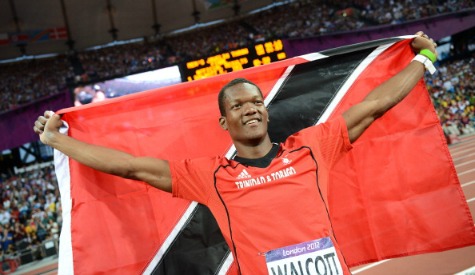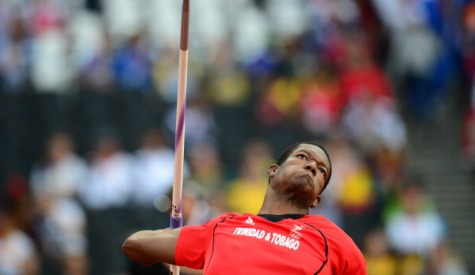 A teen sprinter with world class credentials makes the trip from the United States to Trinidad and Tobago, keen to make an impression at the trials and earn the right to represent the Red, White and Black on the global stage.
A teen sprinter with world class credentials makes the trip from the United States to Trinidad and Tobago, keen to make an impression at the trials and earn the right to represent the Red, White and Black on the global stage.
Sounds familiar? It should. But this is not a reminder, 23 years later, of how Ato Boldon announced his arrival.
A brand new chapter of local track and field history is about to be written, and it will feature 17-year-old Khalifa St Fort. Born in 1998 to a Trinidadian mother, the 17-year-old American can represent either T&T or the US.
“I've always been interested in running for Trinidad and Tobago,” St Fort tells the Express, “pretty much since I started running. That's where my heart is.”
The name, Ato Boldon will feature prominently in the Khalifa St Fort chapter. The 1997 200 metres world champion and four-time Olympic medallist coaches the Florida-born sprinter.
“It always inspires me,” says St Fort, “to have an example to look up to who has gone down the same road that I'm taking. Hopefully, I can follow his path and become an Olympic medallist.”
The young sprinter's father, Marc St Fort was not pleased with his daughter's progress under her high school coach, and approached Boldon for help. The former T&T track star has made a huge difference.
“It felt better to train with Coach Ato. I get the max out of my body, and the full potential. My times have dropped significantly, and I have a better understanding of the sport. I was a 12.2/12-flat sprinter in the 100. Now, I'm down to 11.43. He explains everything while we're doing it, and how to look for what's wrong in the start when he's not around.”
St Fort produced her personal best 11.43 seconds run in striking women's 100m gold at the Golden South Classic, in Orlando, Florida, two Saturdays ago.
“I felt ready to do that time because Coach Ato said I looked good at practice. I was due for a PR (personal record).”
The athlete and coach believe in each other, a crucial ingredient that was missing when St Fort was part of the St Thomas Aquinas programme.
“I realised I had world class potential when I came to Coach Ato. He said I had the potential to be the best in the world if I worked hard, stayed focused and took on his philosophy.”
St Fort bought in to the Boldon philosophy, and has started to reap the rewards.
“It's basically taking all the knowledge I previously knew, and changing it. I didn't know anything about training or competing as a professional.”
St Fort has already achieved one of her major season goals, and is hopeful as she works towards the others.
“My goal was to run in the 11.4/11.3 region in the 100. My main goals are now to run 11.2, make the Trinidad and Tobago team for the World Youth (under-18) Championships, and possibly win there.”
They are all attainable targets, for St Fort is currently in third spot on the 2015 global under-18 100m performance list. Just two sprinters, Americans Candace Hill and Zaria Francis have gone faster than St Fort's 11.43. Hill clocked 11.30 on April 4, while Francis produced an 11.41 run on May 2. And while St Fort is currently 12th on this year's 200m list at 24.03 seconds, she is capable of going much faster, having run a 23.55 PR last year.
St Fort will be on show in T&T this weekend, at the Hasely Crawford Stadium in Port of Spain, where she will bid for the NGC-NAAA Junior Championship girls' under-18 sprint double. She arrives in the country today, and competes in the 100m dash tomorrow. On Sunday, the country's newest sprint sensation will face the starter in the 200m. All things being equal, she will then be named on the T&T team for the July 15-19 World Youth Championships in Cali, Colombia.
St Fort returns to her Florida training base on Monday. But before checking in at Piarco International Airport, she and her mother, Tamika Roberts-St Fort will make a quick visit to Couva.
“I've visited a few times. I was eight or nine the last time. I have memories of staying by my great grandmother in Couva, meeting cousins, and watching cricket on TV with my great aunts and grandmother.”
If everything goes according to plan, St Fort's T&T family connection will again gather around the television in August 2016, this time to cheer on one of their own as she makes her first appearance on an Olympic stage, at the Rio Games
Source
 TRINIDAD AND TOBAGO’S Keshorn Walcott stunned spectators at the IAAF Diamond League Meet in Rome yesterday, throwing the spear a fantastic 86.20 metres to snatch bronze in the Men’s Javelin event and smashing his own national record in the process.
TRINIDAD AND TOBAGO’S Keshorn Walcott stunned spectators at the IAAF Diamond League Meet in Rome yesterday, throwing the spear a fantastic 86.20 metres to snatch bronze in the Men’s Javelin event and smashing his own national record in the process. 
 A teen sprinter with world class credentials makes the trip from the United States to Trinidad and Tobago, keen to make an impression at the trials and earn the right to represent the Red, White and Black on the global stage.
A teen sprinter with world class credentials makes the trip from the United States to Trinidad and Tobago, keen to make an impression at the trials and earn the right to represent the Red, White and Black on the global stage. Former FIFA vice president accuses Sepp Blatter of influencing Trinidad’s 2010 election
Former FIFA vice president accuses Sepp Blatter of influencing Trinidad’s 2010 election A new strategic marketing and brand management plan has been launched by the Trinidad and Tobago Olympic Committee (TTOC) to help it achieve its target of winning at least 10 gold medals by 2024.
A new strategic marketing and brand management plan has been launched by the Trinidad and Tobago Olympic Committee (TTOC) to help it achieve its target of winning at least 10 gold medals by 2024.  The TTOC intends to put in place the required legal checks and balances for Rio 2016 to protect its Olympic franchise, including the TTOC, the Trinidad and Tobago Olympic Team and the legitimate TTOC Olympic sponsors and partners, from opportunistic marketing and ambushers, it has warned.
The TTOC intends to put in place the required legal checks and balances for Rio 2016 to protect its Olympic franchise, including the TTOC, the Trinidad and Tobago Olympic Team and the legitimate TTOC Olympic sponsors and partners, from opportunistic marketing and ambushers, it has warned.  Under the IOC Olympic Charter, the TTOC has sole and exclusive authority for the Trinidad and Tobago Olympic Team, Olympic Movement and Olympic franchise in the jurisdiction of Trinidad and Tobago.
Under the IOC Olympic Charter, the TTOC has sole and exclusive authority for the Trinidad and Tobago Olympic Team, Olympic Movement and Olympic franchise in the jurisdiction of Trinidad and Tobago. ON MAY 27th an early-dawn raid at a posh Swiss hotel brought nine bigwigs from FIFA, football’s international governing body, into custody for allegations of corruption. After years when the game’s leaders managed to avoid any consequences for their unsavoury mismanagement, fans around the world cheered the round-up as a first step towards cleaning up the sport. But the American indictment that put these seemingly untouchable fat cats in the dock had nothing to do with FIFA’s best-known dirty laundry, such as the awarding of the 2022 World Cup to Qatar. Instead, it focused entirely on wrongdoing by officials in the Americas, and in particular on CONCACAF, one of the relative weaklings among FIFA’s six constituent continental federations, which includes North and Central America and the Caribbean. The two biggest fish, Jeffrey Webb and Austin “Jack” Warner (pictured)—the current CONCACAF president and his predecessor—hail from two of the smallest countries in the world, the Cayman Islands and Trinidad and Tobago.
ON MAY 27th an early-dawn raid at a posh Swiss hotel brought nine bigwigs from FIFA, football’s international governing body, into custody for allegations of corruption. After years when the game’s leaders managed to avoid any consequences for their unsavoury mismanagement, fans around the world cheered the round-up as a first step towards cleaning up the sport. But the American indictment that put these seemingly untouchable fat cats in the dock had nothing to do with FIFA’s best-known dirty laundry, such as the awarding of the 2022 World Cup to Qatar. Instead, it focused entirely on wrongdoing by officials in the Americas, and in particular on CONCACAF, one of the relative weaklings among FIFA’s six constituent continental federations, which includes North and Central America and the Caribbean. The two biggest fish, Jeffrey Webb and Austin “Jack” Warner (pictured)—the current CONCACAF president and his predecessor—hail from two of the smallest countries in the world, the Cayman Islands and Trinidad and Tobago. Sports Minister Brent Sancho says he was unaware that a concert booking accepted by the facilities management unit at the Hasely Crawford Stadium (HCS) in Woodbrook forced officials of the National Association of Athletics Administration (NAAA) to reschedule its calendar of championship events originally scheduled to start last weekend.
Sports Minister Brent Sancho says he was unaware that a concert booking accepted by the facilities management unit at the Hasely Crawford Stadium (HCS) in Woodbrook forced officials of the National Association of Athletics Administration (NAAA) to reschedule its calendar of championship events originally scheduled to start last weekend.